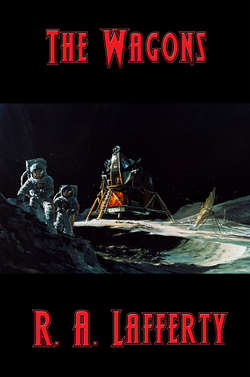Читать книгу The Wagons - R. A. Lafferty - Страница 1
На сайте Литреса книга снята с продажи.
ОглавлениеThe Wagons
by R. A. Lafferty
©2020 Positronic Publishing
The Wagons is a work of fiction. Names, characters, businesses, organizations, places, events and incidents are either the products of the author’s imagination or are used fictitiously. Any resemblance to actual persons, living or dead, events, locales or institutions is entirely coincidental.
All rights reserved. Printed in the United States of America. No part of this book may be used or reproduced in any manner without written permission except for brief quotations for review purposes only.
ISBN 13: 978-1-5154-4424-4
The Wagons
“But when did they have them first? Did they always have them? Who were the first ones to have them?”
“To have what?”
“The wagons. Did they always have wagons?”
“I guess they almost always had them. They had them a long time.”
“Did the Indians have them?”
“No. Not at first. They didn’t have the horse or wagon either at first. But they had the one almost as soon as the other.”
“Did the Spanish have them?”
“Yes, they always had them. They used pack mules too. But they also used the wagon. Why do you ask?”
“Every night after the fire dies down I hear wagons going along the ridge. They sound like real old wagons and I can never find the tracks in the morning. Is that an old wagon road along the ridge?”
“Yes, I think that is an old wagon road. They often went along the ridge just below the sky line.”
Jimmy was nine, and Jim was twenty years older. They both liked to camp out all summer. They traveled in a Ford pickup with an extra drum of gas in the back. They slept on the ground in their rolls and lived on coffee and bacon and flapjacks. They fished in the holes under the cottonwoods and shot jackrabbits and prairie dogs. The father and son were very close on these trips. And they went to ground in the short grass and brush country as though they had lived there for hundreds of years.
“Did they always go west—the wagons?”
“Why no, Jimmy, they couldn’t always go west. They went in all directions.”
“It seems to me they must have gone west most of the time.”
Jimmy hacked out brush with a cradle and bolo. He gathered buffalo chips and cow chips. It was always his job to build the campfire.
“Was there ever a town at Cielito?”
“Yes, there was a little town there once I think, a tent town or a cabin town. I have heard that there was a little town there.”
“I don’t mean a little town. I mean a big town with square after square and wagons solid around them. Was there a big wagon town there a long time ago?”
“I don’t know, Jimmy. I never heard of it.”
“Was there a different kind of wagon that didn’t have the same sort of tongue? It had a different creak, and the horses didn’t sound the same way when they stomp.”
“There were the ox wagons. They were hitched higher and rolled more. And on very early wagons the front wheels did not pivot and the tongue was pegged some way to the under carriage or axle itself. And a very long time ago the wagons were pulled by Onagers and Przewalski horses.”
“That’s the kind of horses. That’s what I hear at night.”
They had cuervo to eat. They rigged it on a spit to roast. It wasn’t so bad if you called it cuervo. Lots of birds are all dark meat. All the wild birds are all dark meat. If you want chicken you can eat it at home.
“What did the Spanish call the wagons?”
“Carro.”
“That’s a cart, that isn’t a wagon.”
“Carro grande.”
“That’s a big cart. A big cart isn’t a wagon. They’re different.”
“I don’t know what they called them then, Jimmy.”
“I think they probably had a long name with a squeak in the middle. Were the wagons always covered?”
“I guess they were covered for a long time.”
“I think they had tents on wagons before they had them anywhere else. I think they had houses on wagons before they had them anywhere else. I guess those were the first houses.”
“They had them a long time ago.”
“Do you think Cielito had another name once?”
“I never heard of it if it had.”
“I think that once it was called Hammadj or Plaustrumopolis.”
“Where did you get names like that, Jimmy?”
“I just remembered them. I remember a lot of things like that. I’m pretty sure the wagon town was called a name like those. Could we go to Cielito in the morning and camp there tomorrow night?”
“Yes, we’ll go there if you want to. There would be water there.”
“Yes, there would have to be water there if they had all those horses there at one time.”
“All what horses?”
“Why, if they had about ten thousand wagons there every night, a lot of them would have four or six or even eight horses. That would be a lot of horses.”
“That would be quite a few, Jimmy. There is an old windmill about a mile from here and you can hear it creak at night. That may be the sound you think is wagons.”
